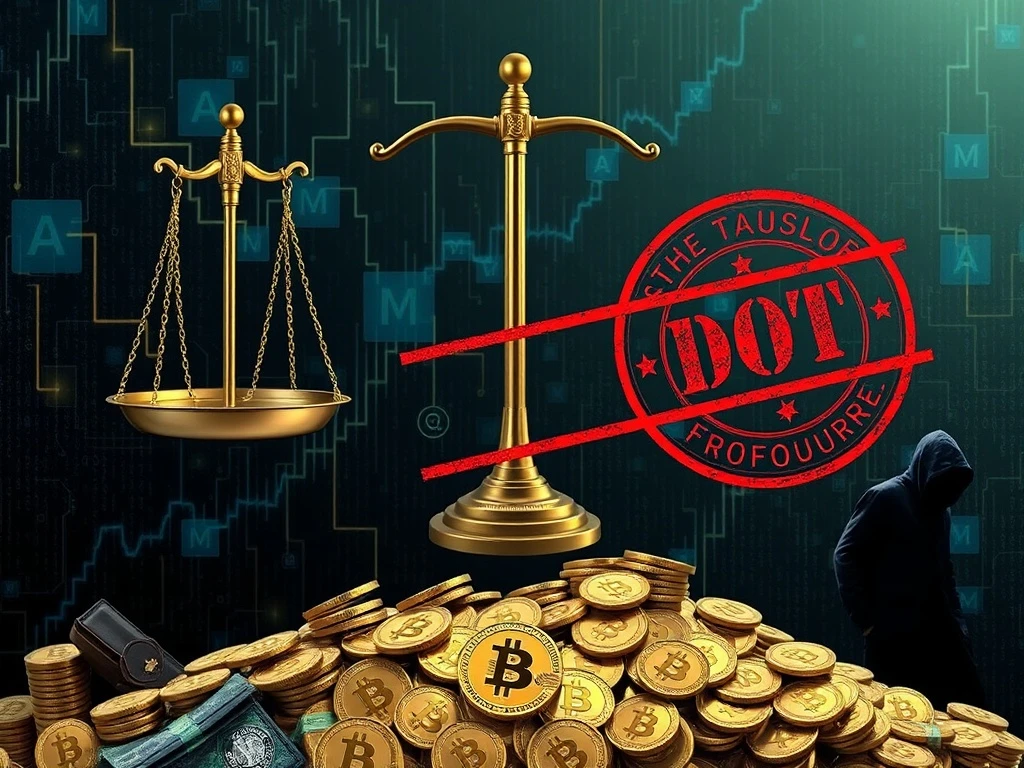LuBian Wallet Unleashes $1.3B Bitcoin Transfer After DOJ Reveals Massive $15B Forfeiture Case

The cryptocurrency landscape just experienced a significant tremor. A wallet, explicitly linked to the prominent Chinese Bitcoin mining operation, LuBian, recently executed a colossal transfer. It moved almost $1.3 billion in Bitcoin. This remarkable activity unfolded merely a day after the U.S. Department of Justice (DOJ) unsealed a crucial indictment. This indictment detailed a massive $15 billion forfeiture case, specifically targeting funds allegedly stolen from the very same mining pool back in 2020. This event underscores the intricate relationship between digital assets, sophisticated financial operations, and rigorous legal enforcement.
LuBian Wallet Activity Surges Amid DOJ Action
On Wednesday, blockchain analytics firm Lookonchain promptly flagged the initial movement. A wallet, dormant for three years, transferred 9,757 Bitcoin. This amount was valued at approximately $1.1 billion at the time. These funds moved into new wallets. Subsequently, Arkham Intelligence provided further details. The wallet later transferred an additional 2,129 BTC, worth about $238 million, on the same day. These combined transfers totaled 11,886 Bitcoin, amounting to roughly $1.3 billion at current market prices.
Interestingly, an investigation by Arkham on August 3, 2023, revealed a significant past event. In 2020, LuBian reportedly suffered a hack, losing 127,426 BTC, then valued at about $3.5 billion. Arkham indicated that the platform had moved 11,886 BTC to recovery wallets. This figure precisely matches the recently transferred LuBian wallet Bitcoin. The following caption describes this critical movement.
LuBian-linked wallet transfers $1.3 billion in Bitcoin. Source: Arkham IntelligenceDOJ Forfeiture Case Targets Prince Holding Group
The recent wallet activity directly preceded a major announcement from the DOJ. Less than a day earlier, the department unsealed an indictment against Prince Holding Group. This Cambodia-based entity faces accusations of orchestrating extensive crypto fraud schemes. On Tuesday, U.S. prosecutors filed a forfeiture complaint. It targeted roughly $14.4 billion, which is tied to an alleged scam network. This network was reportedly led by Chen Zhi, the group’s founder.
Furthermore, the DOJ confirmed that the Bitcoin in question is already in custody. It will be subject to forfeiture proceedings. This will occur following Zhi’s potential conviction. He faces serious charges, including wire fraud and money laundering conspiracy. This legal action signifies a strong stance against illicit financial activities within the crypto space.
Allegations of Crypto Laundering Fuel Mining Operations
According to the DOJ, Zhi and his co-conspirators engaged in crypto laundering. They allegedly laundered illicit proceeds from their operations. These funds were then used to finance large-scale crypto mining ventures. The companies implicated in this scheme include Warp Data, a Laos-based entity, its Texas-based subsidiary, and the China-based LuBian.
Notably, LuBian emerged as the sixth-largest Bitcoin mining pool in 2020. The DOJ claims these companies “produced large sums of clean Bitcoin dissociated from criminal proceeds.” This intricate web of alleged illicit financing highlights the challenges faced by law enforcement in tracking and seizing digital assets. The investigation details the methods used to obscure the origins of criminal funds through legitimate-appearing operations.
Potential Impact on US Bitcoin Reserves and Future Policy
Should the court approve this DOJ forfeiture, the recovered Bitcoin could significantly impact U.S. digital asset holdings. This potential addition would represent one of the largest to the U.S. government’s reserves to date. In March, President Donald Trump signed an executive order. This order formally established a strategic Bitcoin reserve.
At that time, White House AI and crypto czar David Sacks provided clarity. He stated that the reserve would be capitalized with Bitcoin owned by the federal government. Specifically, these funds would come from assets “forfeited as part of criminal or civil asset forfeiture proceedings.” This ongoing case could thus set a precedent. It demonstrates the government’s increasing capacity to seize and integrate digital assets into national reserves. It also signals a hardening stance against financial crimes involving cryptocurrencies.








